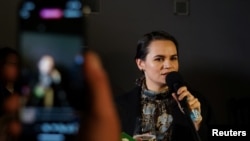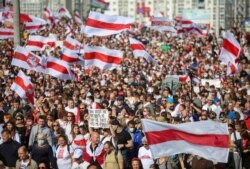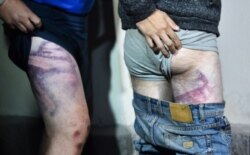Belarusian opposition leader and human rights advocate Sviatlana Tsikhanouskaya has expressed regret that President Alexander Lukashenko met with Russian President Vladimir Putin, as a leading human rights organization accused Belarusian security forces of unlawfully arresting thousands of people and torturing hundreds of others.
The two authoritarian leaders met Monday at a Black Sea resort in Sochi, when Putin granted the Belarusian government a $1.5 billion loan during a period of unrest in Belarus. The meeting was their first since mass protests erupted in Belarus after Lukashenko was reelected to a sixth term in an election widely viewed as rigged.
“We, the Belarusian people, are very sorry that Mr. Putin has supported the dictator in this situation and not the Belarusian people,” Tsikhanouskaya said Wednesday in an interview with VOA. “He sees what is happening in Belarus, that we are the majority, that we no longer want to live under this government.”
Thousands of people have taken part in six weeks of protests that were triggered by a brutal government crackdown shortly after the disputed Aug. 9 election of Lukashenko, which has resulted in the detention of nearly 7,000 people, the deaths of at least three people and hundreds of others being injured.
Tsikhanouskaya, Lukashenko’s election opponent who has left Belarus, said she and other opposition leaders do not consider Lukashenko the legitimate president and that his meeting with Putin is further evidence of the need for change “after new fair elections when the new president will be in power.”
Putin recognizes Lukashenko as the legitimate leader of Belarus, despite the ongoing mass protests.
Detentions, torture
Earlier this week, Human Rights Watch accused Belarusian security forces of detaining and torturing people in the days after Lukashenko’s reelection.
HRW said its findings were based on interviews with 27 former detainees, most of whom were arrested between Aug. 8 and 12, 14 people with knowledge of the arrests, and an examination of 67 videos and written accounts from former detainees and their relatives.
Some of the former detainees said they were arrested in the Belarusian cities of Minsk, Hrodna and Gomel as they participated in peaceful demonstrations. Others alleged that security forces pulled them off the streets or from their vehicles using “extreme violence.”
The detainees said they were subject to beatings, electric shocks and other forms of torture, resulting in injuries such as broken bones, electrical burns, mild traumatic brain injuries, kidney damage and cracked teeth. At least one detainee was allegedly raped.
Mass arrests resumed in the first week of September. The Interior Ministry reported that 600 people were apprehended Sept. 6 alone. The Ministry said another 774 people were arrested in Minsk and other Belarusian cities for holding unsanctioned demonstrations Sunday.
Belarusian authorities also have targeted foreign journalists and local reporters working for foreign and local independent media organizations. HRW said dozens of the journalists have had their media credentials revoked, or have been expelled or harassed.
A journalist in Hrodna said he was arrested despite showing authorities his media credentials. He suffered two broken wrists at the hands of an officer with a Russian special police unit.
Tsikhanouskaya told VOA that those responsible for crimes against protesters must be held accountable.
"All these people who have participated in mass beatings, torture after Aug. 9, of course, have to face the court. But a fair court, after elections, as the judiciary system will be changed for sure," Tsikhanouskaya said. "And everyone will have to be punished, because people will not forgive even a new leader if those crimes would go unpunished."
Response from Lukashenko
Opposition parties, the United States and the European Union allege the election was rigged.
Lukashenko denies the voting was fraudulent and blamed the unrest on meddling by western countries. Russian news agencies quoted him this week saying he has nothing to discuss with the opposition, and that he would be open to constitutional reforms and a potential new presidential election.
During his meeting with Lukashenko, Putin endorsed the possibility of Belarus amending its constitution to lay the groundwork for new elections.
VOA's Ukrainian Service contributed to this report.









![FILE - Demonstrators rally in solidarity with arrested journalists, in Minsk, Belarus, Sept. 3, 2020. The poster, depicting some of the detained, reads: "They [only] did their job." (Svaboda.org - RFE/RL)](https://gdb.voanews.com/dca3790c-3515-4c16-9831-10d001d689c5_w250_r0.jpg)

